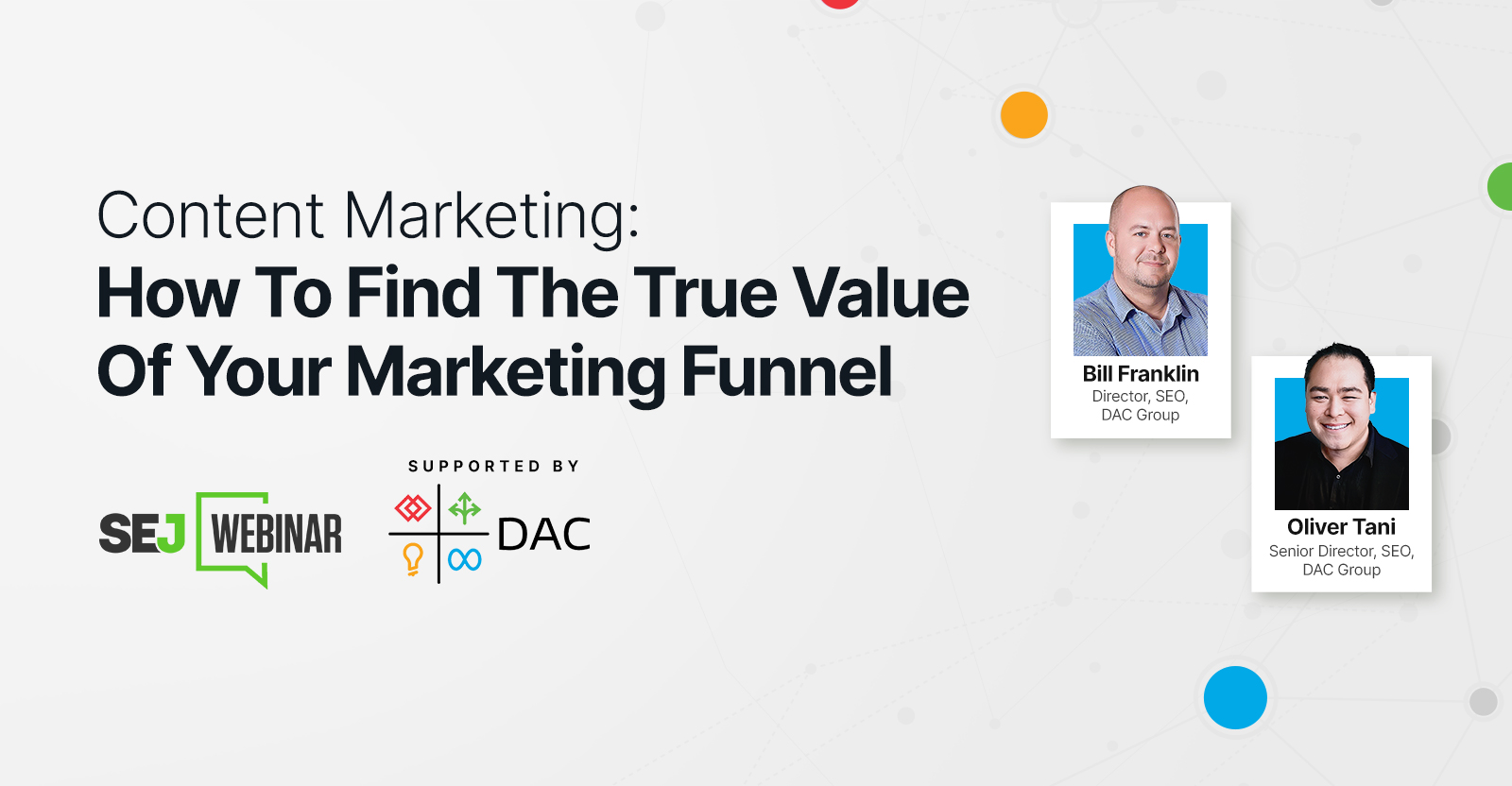SEO
Is There Ranking Power In Keyword Domains?

Domain names with keywords in them are considered valuable for a variety of reasons, including a long-standing idea that they might be directly or indirectly helpful for ranking purposes.
Choosing a domain name is an important step for launching a website, so it’s important to make the right choice.
The choice of a domain name generally falls into three categories:
- Keyword domain.
- Word + keyword domain.
- Brand domain.
It is arguable which approach is best. What is not debatable is that it’s helpful to learn about the topic before making a decision.
Keyword Domains
A keyword domain is a domain name with keywords in it. An example can be Widgets.com.
Using a domain name with the keywords in it can provide the perception of authority.
Some companies own generic domain names and redirect them to their websites, for whatever reason.
For example, Coffee.com redirects to Peet’s Coffee, an artisanal coffee roasting company. That makes it easy for people to navigate to Peet’s.
But, the downside of generic keyword domains is that “all of the good ones” are already registered and prohibitively expensive to pry off of a domainer.
There is also some internet history related to generic keyword domains.
There was a time when internet users typed the keywords of a product or service they wanted straight into the browser or search engine. This practice was called direct navigation.
Direct navigation resulted in significant ad revenues to those who owned those domains and “parked” them.
Parking the domain was setting it up so that the domain names showed ads and only ads.
The lucrative business of parked domains was helped by search engines of the time that ranked those parked domain names in the search results.
So, if someone typed a one-word query like [burgers], then Google might rank Burgers.com.
Then in 2011, Google reduced the search visibility of parked domains from the search results.
So, is there ranking power to keyword domains? Not anymore, but John Mueller of Google has something to say about it, more on that below.
Word + Keyword Domain
That’s why the popular choice is to add a word to the domain name that helps to describe what a site visitor can expect on the site.
This results in domains like Cheap[name of product/service].com, [name of product/service]Reviews.com, Fast[name of product/service], and so on.
A word plus a keyword for a domain name is not a bad way to go.
Upside Of Word + Keyword Domain
The keyword instantly brands what the site is about, and the word tells the site visitor what to expect in terms of the user intent.
Searching for a review? Try [name of product/service]Reviews.com.
Downside Of Word + Keyword Domain
The downside of this approach is that it locks the website into providing a specific niche and can limit its ability to grow.
So, if you start out as [JoesCameraReviews], it’s going to be hard to transition that site to reviewing (or selling) other products.
There are many sites with keywords in the domain that rank very well.
Branded Domain
A branded domain is a domain name that doesn’t necessarily have keywords in it.
Amazon, Zappos, and Etsy are examples of branded domains.
What’s great about a branded domain is that the brand name is that it doesn’t necessarily limit what the site can be about.
Many sites with branded domains have very little trouble ranking in the search results.
Google Offers Four Insights On Keyword Domains
In the course of answering a question in a recent Webmaster Hangout, Google’s John Mueller offered four insights on the ranking power of keyword domain names.
Four insights into Keyword Domains and Ranking:
- Keyword domains don’t rank faster.
- Keyword domains don’t automatically rank better.
- Keyword domains lost strong ranking influence years ago.
- Keyword domains ranked the same as branded domains.
1. Keyword Domains Don’t Have A Time Advantage
There is a belief that keyword domains are able to rank better faster than branded domains. But according to Google’s John Mueller, this is not the case.
There is a perceived advantage with obtaining keywords in links through the anchor text. This is something that’s been discussed for years. An argument can be made for and against.
Unfortunately, John Mueller’s statement didn’t address this perceived advantage.
Here’s what John Mueller confirmed:
“…it takes time like any other new website… Obviously there are lots of websites out there that do rank for the keywords in their domain name. But they worked on this maybe for years and years…”
2. Keywords In Domains Don’t Rank Better
John Mueller was quite firm in asserting that keyword domains do not rank better than branded domains.
“…just because keywords are in a domain name doesn’t mean that it’ll automatically rank for those keywords.”
There is so much that goes into ranking, like content, user intent for that content as well as links. All of that likely takes significant precedence toward something like keywords in the domain.
While John Mueller didn’t specifically say keywords in the domain name are not a ranking signal, he did affirm that there is no dramatic benefit from having the keywords in the domain name. And that’s an important insight.
3. Keyword Domains Lost Influence Years Ago
John Mueller asserted that keyword domains lost influence years ago.
Here is what John Mueller stated:
“…just because keywords are in a domain name doesn’t mean that it’ll automatically rank for those keywords. And that’s something that’s been the case for a really, really long time.”
This may be a reference to an algorithm update from 2011 (official Google announcement here).
In late 2011, Google updated its algorithm to add a classifier to remove parked domains from the search results.
A quote from Google’s algorithm update announcement:
“This is a new algorithm for automatically detecting parked domains. Parked domains are placeholder sites with little unique content for our users and are often filled only with ads.
In most cases, we prefer not to show them.”
Nevertheless, the idea that keyword domains were better than brand domains continued in the search industry, even though Google was no longer giving a boost to parked keyword domains.
An argument can be made that there is a minimal signal. But there is nothing to lend support to that theory.
It’s been a long time since any search engine has published research that included keywords in domains as any kind of signal.
We’re living in a time when keywords in headings (H1, H2) have diminished ranking weight.
Current algorithms no longer give extra weight to title tags. This we know, and it calls into question the idea that Google continues to give a direct ranking bonus to a keyword in a domain name.
4. Keyword Domains Ranked The Same As Branded Domains
This is another statement that contradicts the idea that keywords in a domain name have a ranking benefit.
John Mueller points out that the keywords in a domain are unrelated to their current ranking:
John Mueller’s statement on keywords in domains:
“…it’s kind of normal that they would rank for those keywords and that they happen to have them in their domain name is kind of unrelated to their current ranking.”
Mueller clearly notes that having the keywords in the domain name is unrelated to their ranking.
Research A Domain Name Before Using It
It’s always a good idea to research a domain name to see if it was previously registered and how it was used.
There are rare cases where a domain that was used to spam can become stuck in a Google algorithm loop, causing it to become banned for a month, getting released for a few days then banned all over again, preventing the site from ranking higher than the second page of the search results.
For more information on the legacy domain penalty, read Google Algorithm Bug Puts Sites In Weird Limbo State.
SEO Advantage Of Keyword Domains
There are many advantages to having a keyword in a domain name. But an SEO advantage is not necessarily one of the advantages, as Mueller makes clear.
“…that they happen to have them in their domain name is kind of unrelated to their current ranking.”
Stand Out With Your Domain
It may be a good idea to choose a domain that stands out. This can be with a keyword or it could be with a brand name.
Former Googler Matt Cutts recommended in a webmaster help video in 2011 that choosing a domain name that stands out can be a good idea in certain situations.
“For example, if you have 15 sites about Android and they all have Android, Android, Android, Android, it’s going to be a little hard to remember, to rise above the noise, to rise above the din.
Whereas, if you have something that’s a little more brandable, then people are going to remember that. They’re going to be able to come back to it. Even sites like TechCrunch, nothing in there says tech news.”
Takeaway On Domain Names
There are pros and cons to the different kinds of domain names to use for a website.
If the business wants to leave wiggle room to grow to encompass a wider topic, then a domain name that is less committed to a topic or even a brand name is appropriate.
Of course, one can start out with a narrow-topic domain name and change it in the future. But that can result in other sites changing their mind about linking to the site and fans of the site losing interest.
So, the best advice may be for the business to consider what it wants to accomplish now, what impression it wants to make to site visitors, what story the domain name communicates to the visitor, and also how well the domain name fits into the future of the business.
On the question of ranking, it’s clear that there is no direct keyword-based ranking benefit to a domain name, which makes selecting one a little easier.
Watch John Mueller discuss domain names at the 21:50 minute mark:
More Resources:
Featured Image: Master1305/Shutterstock
!function(f,b,e,v,n,t,s)
{if(f.fbq)return;n=f.fbq=function(){n.callMethod?
n.callMethod.apply(n,arguments):n.queue.push(arguments)};
if(!f._fbq)f._fbq=n;n.push=n;n.loaded=!0;n.version=’2.0′;
n.queue=[];t=b.createElement(e);t.async=!0;
t.src=v;s=b.getElementsByTagName(e)[0];
s.parentNode.insertBefore(t,s)}(window,document,’script’,
‘https://connect.facebook.net/en_US/fbevents.js’);
if( typeof sopp !== “undefined” && sopp === ‘yes’ ){
fbq(‘dataProcessingOptions’, [‘LDU’], 1, 1000);
}else{
fbq(‘dataProcessingOptions’, []);
}
fbq(‘init’, ‘1321385257908563’);
fbq(‘track’, ‘PageView’);
fbq(‘trackSingle’, ‘1321385257908563’, ‘ViewContent’, {
content_name: ‘ranking-power-keyword-domains’,
content_category: ‘seo technical-seo’
});
SEO
Measuring Content Impact Across The Customer Journey

Understanding the impact of your content at every touchpoint of the customer journey is essential – but that’s easier said than done. From attracting potential leads to nurturing them into loyal customers, there are many touchpoints to look into.
So how do you identify and take advantage of these opportunities for growth?
Watch this on-demand webinar and learn a comprehensive approach for measuring the value of your content initiatives, so you can optimize resource allocation for maximum impact.
You’ll learn:
- Fresh methods for measuring your content’s impact.
- Fascinating insights using first-touch attribution, and how it differs from the usual last-touch perspective.
- Ways to persuade decision-makers to invest in more content by showcasing its value convincingly.
With Bill Franklin and Oliver Tani of DAC Group, we unravel the nuances of attribution modeling, emphasizing the significance of layering first-touch and last-touch attribution within your measurement strategy.
Check out these insights to help you craft compelling content tailored to each stage, using an approach rooted in first-hand experience to ensure your content resonates.
Whether you’re a seasoned marketer or new to content measurement, this webinar promises valuable insights and actionable tactics to elevate your SEO game and optimize your content initiatives for success.
View the slides below or check out the full webinar for all the details.
SEO
How to Find and Use Competitor Keywords

Competitor keywords are the keywords your rivals rank for in Google’s search results. They may rank organically or pay for Google Ads to rank in the paid results.
Knowing your competitors’ keywords is the easiest form of keyword research. If your competitors rank for or target particular keywords, it might be worth it for you to target them, too.
There is no way to see your competitors’ keywords without a tool like Ahrefs, which has a database of keywords and the sites that rank for them. As far as we know, Ahrefs has the biggest database of these keywords.
How to find all the keywords your competitor ranks for
- Go to Ahrefs’ Site Explorer
- Enter your competitor’s domain
- Go to the Organic keywords report
The report is sorted by traffic to show you the keywords sending your competitor the most visits. For example, Mailchimp gets most of its organic traffic from the keyword “mailchimp.”


Since you’re unlikely to rank for your competitor’s brand, you might want to exclude branded keywords from the report. You can do this by adding a Keyword > Doesn’t contain filter. In this example, we’ll filter out keywords containing “mailchimp” or any potential misspellings:


If you’re a new brand competing with one that’s established, you might also want to look for popular low-difficulty keywords. You can do this by setting the Volume filter to a minimum of 500 and the KD filter to a maximum of 10.


How to find keywords your competitor ranks for, but you don’t
- Go to Competitive Analysis
- Enter your domain in the This target doesn’t rank for section
- Enter your competitor’s domain in the But these competitors do section


Hit “Show keyword opportunities,” and you’ll see all the keywords your competitor ranks for, but you don’t.


You can also add a Volume and KD filter to find popular, low-difficulty keywords in this report.


How to find keywords multiple competitors rank for, but you don’t
- Go to Competitive Analysis
- Enter your domain in the This target doesn’t rank for section
- Enter the domains of multiple competitors in the But these competitors do section


You’ll see all the keywords that at least one of these competitors ranks for, but you don’t.


You can also narrow the list down to keywords that all competitors rank for. Click on the Competitors’ positions filter and choose All 3 competitors:


- Go to Ahrefs’ Site Explorer
- Enter your competitor’s domain
- Go to the Paid keywords report


This report shows you the keywords your competitors are targeting via Google Ads.
Since your competitor is paying for traffic from these keywords, it may indicate that they’re profitable for them—and could be for you, too.
You know what keywords your competitors are ranking for or bidding on. But what do you do with them? There are basically three options.
1. Create pages to target these keywords
You can only rank for keywords if you have content about them. So, the most straightforward thing you can do for competitors’ keywords you want to rank for is to create pages to target them.
However, before you do this, it’s worth clustering your competitor’s keywords by Parent Topic. This will group keywords that mean the same or similar things so you can target them all with one page.
Here’s how to do that:
- Export your competitor’s keywords, either from the Organic Keywords or Content Gap report
- Paste them into Keywords Explorer
- Click the “Clusters by Parent Topic” tab


For example, MailChimp ranks for keywords like “what is digital marketing” and “digital marketing definition.” These and many others get clustered under the Parent Topic of “digital marketing” because people searching for them are all looking for the same thing: a definition of digital marketing. You only need to create one page to potentially rank for all these keywords.


2. Optimize existing content by filling subtopics
You don’t always need to create new content to rank for competitors’ keywords. Sometimes, you can optimize the content you already have to rank for them.
How do you know which keywords you can do this for? Try this:
- Export your competitor’s keywords
- Paste them into Keywords Explorer
- Click the “Clusters by Parent Topic” tab
- Look for Parent Topics you already have content about
For example, if we analyze our competitor, we can see that seven keywords they rank for fall under the Parent Topic of “press release template.”


If we search our site, we see that we already have a page about this topic.


If we click the caret and check the keywords in the cluster, we see keywords like “press release example” and “press release format.”


To rank for the keywords in the cluster, we can probably optimize the page we already have by adding sections about the subtopics of “press release examples” and “press release format.”
3. Target these keywords with Google Ads
Paid keywords are the simplest—look through the report and see if there are any relevant keywords you might want to target, too.
For example, Mailchimp is bidding for the keyword “how to create a newsletter.”


If you’re ConvertKit, you may also want to target this keyword since it’s relevant.
If you decide to target the same keyword via Google Ads, you can hover over the magnifying glass to see the ads your competitor is using.


You can also see the landing page your competitor directs ad traffic to under the URL column.


Learn more
Check out more tutorials on how to do competitor keyword analysis:
SEO
Google Confirms Links Are Not That Important

Google’s Gary Illyes confirmed at a recent search marketing conference that Google needs very few links, adding to the growing body of evidence that publishers need to focus on other factors. Gary tweeted confirmation that he indeed say those words.
Background Of Links For Ranking
Links were discovered in the late 1990’s to be a good signal for search engines to use for validating how authoritative a website is and then Google discovered soon after that anchor text could be used to provide semantic signals about what a webpage was about.
One of the most important research papers was Authoritative Sources in a Hyperlinked Environment by Jon M. Kleinberg, published around 1998 (link to research paper at the end of the article). The main discovery of this research paper is that there is too many web pages and there was no objective way to filter search results for quality in order to rank web pages for a subjective idea of relevance.
The author of the research paper discovered that links could be used as an objective filter for authoritativeness.
Kleinberg wrote:
“To provide effective search methods under these conditions, one needs a way to filter, from among a huge collection of relevant pages, a small set of the most “authoritative” or ‘definitive’ ones.”
This is the most influential research paper on links because it kick-started more research on ways to use links beyond as an authority metric but as a subjective metric for relevance.
Objective is something factual. Subjective is something that’s closer to an opinion. The founders of Google discovered how to use the subjective opinions of the Internet as a relevance metric for what to rank in the search results.
What Larry Page and Sergey Brin discovered and shared in their research paper (The Anatomy of a Large-Scale Hypertextual Web Search Engine – link at end of this article) was that it was possible to harness the power of anchor text to determine the subjective opinion of relevance from actual humans. It was essentially crowdsourcing the opinions of millions of website expressed through the link structure between each webpage.
What Did Gary Illyes Say About Links In 2024?
At a recent search conference in Bulgaria, Google’s Gary Illyes made a comment about how Google doesn’t really need that many links and how Google has made links less important.
Patrick Stox tweeted about what he heard at the search conference:
” ‘We need very few links to rank pages… Over the years we’ve made links less important.’ @methode #serpconf2024″
Google’s Gary Illyes tweeted a confirmation of that statement:
“I shouldn’t have said that… I definitely shouldn’t have said that”
Why Links Matter Less
The initial state of anchor text when Google first used links for ranking purposes was absolutely non-spammy, which is why it was so useful. Hyperlinks were primarily used as a way to send traffic from one website to another website.
But by 2004 or 2005 Google was using statistical analysis to detect manipulated links, then around 2004 “powered-by” links in website footers stopped passing anchor text value, and by 2006 links close to the words “advertising” stopped passing link value, links from directories stopped passing ranking value and by 2012 Google deployed a massive link algorithm called Penguin that destroyed the rankings of likely millions of websites, many of which were using guest posting.
The link signal eventually became so bad that Google decided in 2019 to selectively use nofollow links for ranking purposes. Google’s Gary Illyes confirmed that the change to nofollow was made because of the link signal.
Google Explicitly Confirms That Links Matter Less
In 2023 Google’s Gary Illyes shared at a PubCon Austin that links were not even in the top 3 of ranking factors. Then in March 2024, coinciding with the March 2024 Core Algorithm Update, Google updated their spam policies documentation to downplay the importance of links for ranking purposes.
The documentation previously said:
“Google uses links as an important factor in determining the relevancy of web pages.”
The update to the documentation that mentioned links was updated to remove the word important.
Links are not just listed as just another factor:
“Google uses links as a factor in determining the relevancy of web pages.”
At the beginning of April Google’s John Mueller advised that there are more useful SEO activities to engage on than links.
Mueller explained:
“There are more important things for websites nowadays, and over-focusing on links will often result in you wasting your time doing things that don’t make your website better overall”
Finally, Gary Illyes explicitly said that Google needs very few links to rank webpages and confirmed it.
I shouldn’t have said that… I definitely shouldn’t have said that
— Gary 鯨理/경리 Illyes (so official, trust me) (@methode) April 19, 2024
Why Google Doesn’t Need Links
The reason why Google doesn’t need many links is likely because of the extent of AI and natural language undertanding that Google uses in their algorithms. Google must be highly confident in its algorithm to be able to explicitly say that they don’t need it.
Way back when Google implemented the nofollow into the algorithm there were many link builders who sold comment spam links who continued to lie that comment spam still worked. As someone who started link building at the very beginning of modern SEO (I was the moderator of the link building forum at the #1 SEO forum of that time), I can say with confidence that links have stopped playing much of a role in rankings beginning several years ago, which is why I stopped about five or six years ago.
Read the research papers
Authoritative Sources in a Hyperlinked Environment – Jon M. Kleinberg (PDF)
The Anatomy of a Large-Scale Hypertextual Web Search Engine
Featured Image by Shutterstock/RYO Alexandre
-

 PPC5 days ago
PPC5 days ago19 Best SEO Tools in 2024 (For Every Use Case)
-

 MARKETING6 days ago
MARKETING6 days agoStreamlining Processes for Increased Efficiency and Results
-
SEARCHENGINES6 days ago
Daily Search Forum Recap: April 17, 2024
-

 SEO6 days ago
SEO6 days agoAn In-Depth Guide And Best Practices For Mobile SEO
-

 PPC6 days ago
PPC6 days ago97 Marvelous May Content Ideas for Blog Posts, Videos, & More
-
SEARCHENGINES5 days ago
Daily Search Forum Recap: April 18, 2024
-

 MARKETING6 days ago
MARKETING6 days agoEcommerce evolution: Blurring the lines between B2B and B2C
-
SEARCHENGINES4 days ago
Daily Search Forum Recap: April 19, 2024
















You must be logged in to post a comment Login